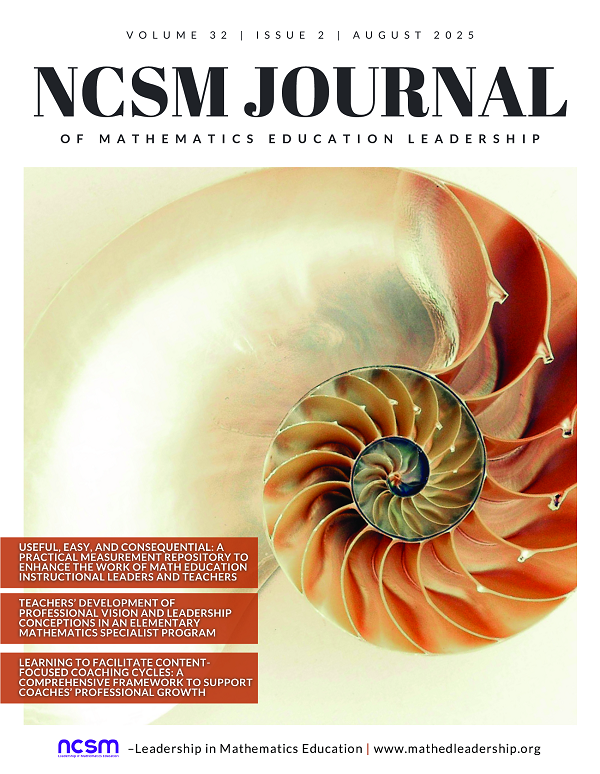
August 2025, Volume 32, Number 2
Table of ContentsView the Journal
Articles in this issue
USEFUL, EASY, AND CONSEQUENTIAL
by: Kirk Walters, Angela Knos, Andrew Brannegan, and Sola Takahashi
To improve and inspire high-quality mathematics teaching and learning, teachers and instructional leaders need access to data that are meaningfully connected to practice. Although most schools and districts are inundated with data (e.g., annual state test scores, data from any number of interim assessment systems), these data are not always helpful in terms of making timely adjustments to instruction, teacher professional learning, and other crucial factors affecting student mathematics outcomes. In this paper, we discuss the potential of practical measurement to fill this gap and address tensions facing math leaders. Unlike most data-driven accountability measures, practical measures are easy for teachers and leaders to collect and interpret data, enabling teachers to adjust instruction in a timely manner. We provide a repository of practical measures leaders can add to their instructional tool belts, discuss how middle-grade mathematics instructional leaders have used therepository to promote continuous improvement, and outline considerations for leaders and coaches in using practical measures to support their ongoing work with math educators.
View this article
DEVELOPMENT OF PROFESSIONAL VISION AND LEADERSHIP CONCEPTIONS
by: Corey Webel, Eric Partridge, and Phi Nguyen
In this paper, we share some ways a cohort of 24 elementary teachers developed over the course of a 2-year elementary mathematics specialist (EMS) certification program. We analyzed pre-, mid-, and post-program interviews to document the development of teachers’ visions for high quality mathematics instruction and their views about themselves as mathematics leaders in their schools. We also conducted end-of-program focus groups with a subset of participants (n = 13) to ask about program elements that helped them develop as teachers and leaders of mathematics. Participants identified several common elements of the program as impacting their knowledge, practice, confidence, leadership, and vision, including specific course assignments and cultivation of a supportive community in the cohort.
View this article
LEARNING TO FACILITATE CONTENTFOCUSED COACHING CYCLES
by: Ryan Gillespie, Jennifer Kruger, Cynthia Callard, and Kenley Rier
This paper serves two purposes. First, we present the content-focused coaching implementation framework, a comprehensive tool to support mathematics coaches in navigating the complexities of facilitating coaching cycles with teachers. Second, we describe a research study in which we partnered with nine mathematics coaches and examined how the framework influenced coaches’ perceptions of their professional growth when facilitating coaching cycles with local teachers. Through analysis of postcoaching cycle interviews, study participants reported the framework supported them to prepare intentionally for the three distinct phases of the coaching cycle (i.e., planning conversation, lesson implementation, debriefing conversation) and make responsive, “in-the-moment” decisions. Coaches also shared ways in which the frameworksparked new insights about coaching. We discuss how our findings connected to and extended prior research on coach learning and the use of coaching tools. We also present implications of our framework and findings for practicing mathematics coaches and future researchers.
View this article
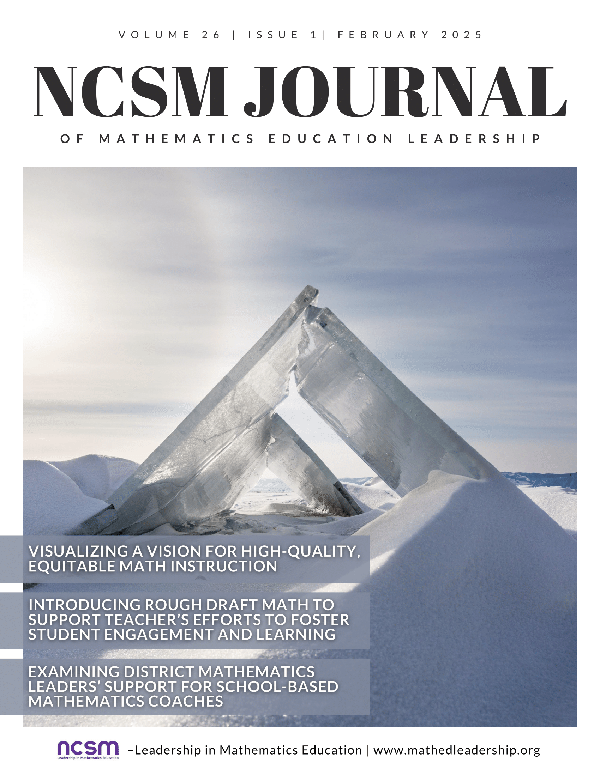
February 2025, Volume 26, Number 1
Table of ContentsView the Journal
Articles in this issue
EQUITABLE MATH INSTRUCTION VISION
by: Katherine Baker, Catherine S. Schwartz, Ashley N. Whitehead, Olufunke Adefope
In this article, we overview a professional learningtask that involves drawing one’s vision forhigh-quality, equitable mathematics instruction(HQEMI). The task is part of the ongoing workof a statewide research practice partnership thatsupports a shared vision of mathematics acrossthe state K–12 system. Our work of HQEMI isrooted in the development of Munter’s (2014)four dimensions for visions of high-qualitymathematics instruction (VHQMI): the role ofthe teacher, classroom discourse, mathematicaltasks, and student engagement. The first threedimensions are particularly useful in the workof the drawing task. In this article, we share anoverview of the drawing task, its implementationwith educators, and sample drawings, detailinghow personal drawings were made visibleacross participants and the conversations resultingfrom viewing and reflecting on one another’sdrawings. These conversations helped surfacedisparities in notions of ideal mathematics instructionand provided space for negotiation ofshared meaning. We provide themes and overarchingconsiderations from these conversationsto highlight discussions that might be elicitedthrough this task in future iterations. Finally, weprovide recommendations for implementing thetask and consider how the task might be adaptedfor others’ contexts to support professionallearning about and development of a sharedvision for mathematics.
View this article
ROUGH DRAFT MATH FOR ENGAGED LEARNING
by: Liza Bondurant, Amanda Jansen
Mathematics educators often face the challenge ofstudents disliking mathematics or experiencing anegative relationship with the subject. Intentionalteaching practices can be a mechanism to mitigatethis challenge; thus, preservice and novice teacherswould benefit from opportunities to developsuch teaching practices. This research exploredthe potential of rough draft math (RDM) to supportteachers in addressing these issues. RDM isa pedagogical approach where students discussand share their preliminary mathematical ideaswithout the fear of being wrong. Teachers welcomerough draft thinking, which gives students explicitopportunities to revise their work or thinking. Thisstudy examined the impact of RDM on preserviceand novice secondary mathematics teachersthrough their written reflections on opportunitiesto learn about the approach through readings.Findings suggested that the readings can promotepreservice and novice teachers’ awareness of howRDM can foster a more comfortable and engaginglearning environment, highlighting the importanceof teachers holding a nonevaluative stance towardstudents’ thinking and teachers’ roles in facilitatingmathematical discourse.
View this article
DISTRICT LEADERS IN SUPPORT OF COACHES
by: Nicholas Kochmanski, Peter Holt Wilson, Ginger Rhodes, Joshua Recore
Mathematics coaching differs significantly frommathematics teaching, and many coaches transitionto the role directly from teaching with limitedopportunities to learn to work effectively withteachers. Although coach professional developmentcan provide one source of support for coaches’learning, coaches might also benefit from closework with other accomplished facilitators of teachers’learning, such as district mathematics leaders.This study analyzed interviews with 15 districtmathematics leaders to understand whether andhow they supported school-based mathematicscoaches. We found 13 of 15 leaders worked closelywith coaches to support them, and we identifiedseven ways they did so (e.g., classroom visits withcoaches). Our findings have significance for researchon district leadership and district leaders’support for coaches.
View this article
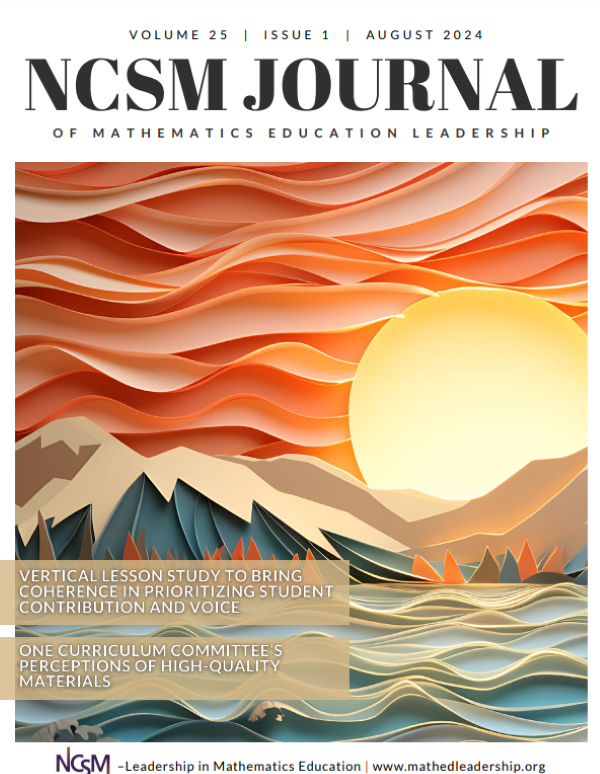
Summer 2024, Volume 25, Number 1
Table of ContentsView the Journal
Articles in this issue
VERTICAL LESSON STUDY VERTICAL LESSON STUDY TO BRING COHERENCE IN PRIORITIZING STUDENT CONTRIBUTION AND VOICE
by: Holly Tate, Jennifer Suh, Amy Christensen, Kaitlin Kaplewicz, Jacqueline Carlson, Jenny Carter
This article tells the story of a team of K-6 teachers who engaged in action research through Lesson Study to build equitable classroom structures through discourse-rich vertical tasks. Founded within the key recommendations of Catalyzing Change (NCTM, 2020), our community explored ways to prioritize student voice and distribute student mathematical contributions across more students within correlated patterning tasks.
View this article
ONE CURRICULUM COMMITTEE’S PERCEPTIONS OF HIGH-QUALITY MATERIALS
by: Erica N. Mason, Camille Griffin, Ga Kyung Jeong
This paper highlights aspects of the curriculum adoption process that may have previously been overlooked—the degree to which the curriculum committee has a shared view with one another of material quality, including committee members’ views about material appropriateness and the alternatives they would recommend for students. We highlight one curriculum committee’s perspectives, which were generally coherent with one another with respect to their views of material quality and appropriateness. In addition to describing details of the project, we share key insights and make recommendations for how other districts might attend to these aspects of a curriculum series adoption that promote more inclusive mathematics experiences for all students.
View this article
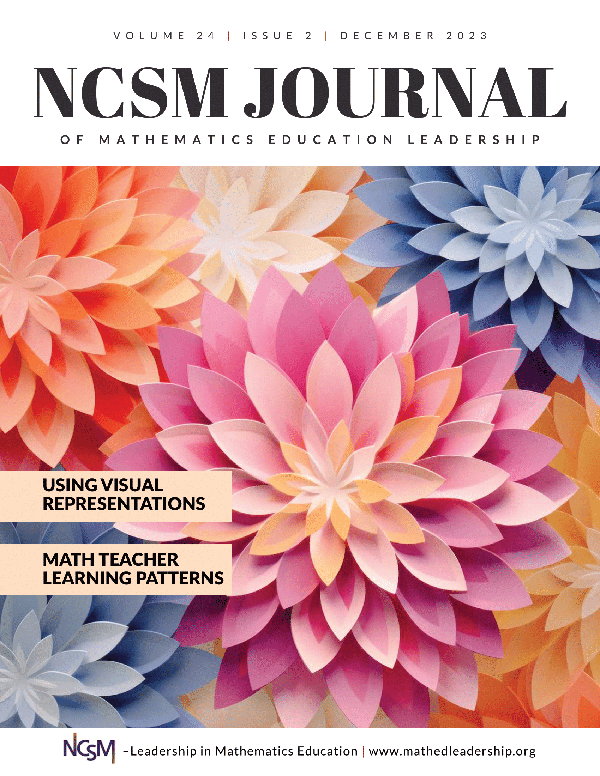
Fall 2023, Volume 24, Number 2
Table of ContentsView the Journal
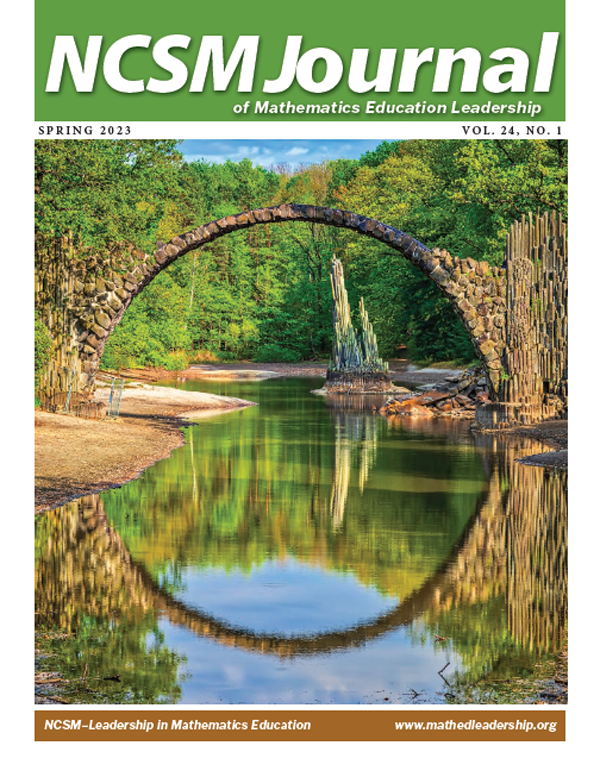
Spring 2023, Volume 24, Number 1
Table of ContentsView the Journal
Articles in this issue
CRITICAL COLLEAGUESHIP DEVELOPMENT AMONGST ELEMENTARY INSTRUCTIONAL LEADERS: A COMPARATIVE ANALYSIS OF PROCESS AND OUTCOMES
by: Sara Donaldson
Mathematics coaches, as school-based instructional leaders, are well situated to promote instructional effectiveness and student learning. This ability is enhanced through ongoing professional learning opportunities that position them alongside other instructional leaders actively developing the skills, knowledge, and dispositions necessary for facilitating change. This study, conducted in an urban school setting, draws on social learning theories to examine the influence of professional learning processes on mathematics instructional leaders’ critical colleagueship development and collaborative inquiry engagement. Findings indicate increasing attention on establishing collaboration agreements, shared transformational learning goals, and consistent meeting structures promotes critical colleagueship and team functioning in support of coaches’ own professional learning and their facilitation of learning for the teachers whom they support.
View this article
HOW UNDERSTANDING MATHEMATICAL DISCOURSES SHAPES PRINCIPAL NOTICING
by: Heidi Rhodes, Kristin Lesseig,David Slavit
Principal leadership is a key factor in student achievement, but we are not yet sure how knowledge of content influences leadership. Teacher evaluation systems assume principals understand the pedagogical content knowledge (PCK) for multiple disciplines, a particularly challenging expectation for secondary leaders. This study presents a noticing frame- work of PCK for leadership that describes a progression through four levels, from content-neutral pedagogy to an interconnection between pedagogy and mathematical discourses. Using the framework, the study provides evidence that principals can learn to notice significant mathematical events but may struggle to respond to teachers about those events. The framework can serve as a tool for leaders to learn to notice the role of mathematics in classrooms during their work with teachers.
View this article
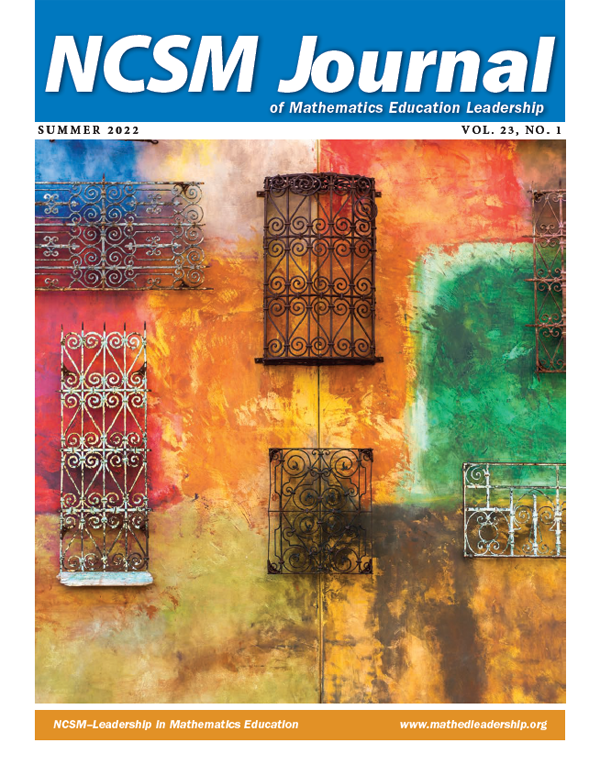
Summer 2022, Volume 23, Number 1
Table of ContentsView the Journal
Articles in this issue
BEYOND RIGHT OR WRONG: SUPPORTING TEACHERS IN STRENGTHS-BASED APPROACHES TO EXAMINING STUDENT WORK
by: Stacey C. Zimmerman, P. Holt Wilson
Recognizing the strengths of students through their written work takes time, practice, and intentionality. In this article, we detail a set of questions that can be used to purposefully engage with student written work in a strengths-based way. Derived from the exploration of experienced mathematics educators’ mathematical knowledge for teaching quadratic functions, the questions place value on student thinking while providing the opportunity for teachers to enhance and extend their own mathematical knowledge for teaching. Mathematics leaders can use these questions to facilitate meaningful learning experiences for teachers, professional learning communities, and large group professional development activities.
View this article
INFLUENCING ELEMENTARY PRINCIPALS’ LEADERSHIP SELF-EFFICACY FOR MATHEMATICS: A PROFESSIONAL DEVELOPMENT CASE STUDY
by: Kelly Gomez Johnson, Paula Jakopovic
Building principals are uniquely positioned to drive change, however, often find themselves learning alongside teachers. Principals are key in establishing a vision for high-quality instruction and influencing teacher practice. However, professional development (PD) for principals needs to prepare and support their beliefs, knowledge, and skills as instructional leaders in subject-specific areas like mathematics. This article describes a districtwide, mathematics focused PD model to support principal development. This study examined how PD activities, designed around Bandura’s sources of self-efficacy, influenced principal self-efficacy as mathematics instructional leaders. Findings of this qualitative case study include four themes of PD activities that enhanced principal self-efficacy. Implications of this study may serve school district leaders as they support principals’ development as instructional leaders in subject-specific areas.
View this article
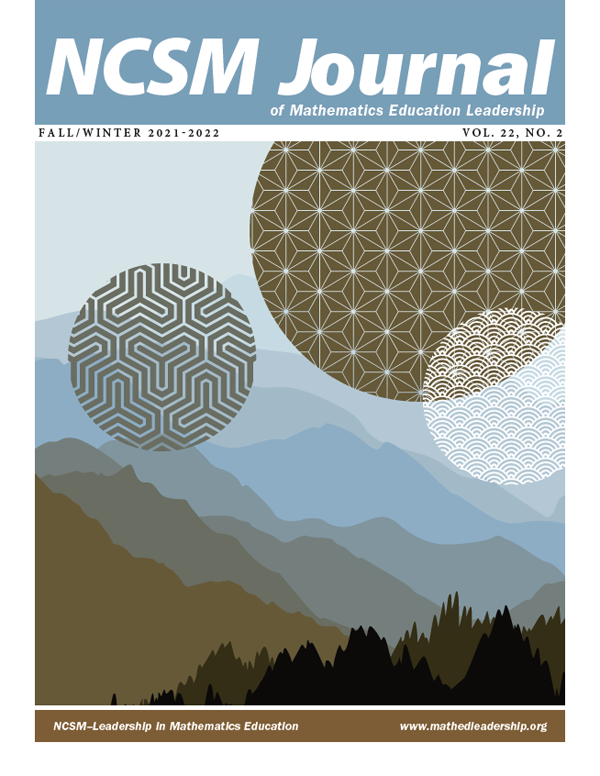
Fall / Winter 2021-2022, Volume 22, Number 2
Table of ContentsView the Journal
Articles in this issue
IMPLEMENTING LESSON STUDY: CHALLENGES IDENTIFIED BY EMERGING TEACHER LEADERS
by: Angela T. Barlow, J. Christopher Willingham, Alyson E. Lischka, D. Christopher Stephens, Kristin S. Hartland
Within the context of a professional development project, we supported emerging teacher leaders as they facilitated teachers’ engagement in the lesson study process. In this paper, we share the self-identified challenges met by this group as as they led lesson study in their school settings. In addition, we share lessons learned in response to these challenges. Implications for mathematics education leaders are included.
View this article
LEADERSHIP FROM WITHIN THE CLASSROOM: OPPORTUNITIES AND CHALLENGES FOR ELEMENTARY MATHEMATICS SPECIALISTS
by: Kimberly A. Conner, Phi Nguyen, Christina Sheffel, Corey Webel
In this article, we describe the leadership opportunities and challenges experienced by eight Elementary Mathematics Specialists (EMS) who had all remained in their primary role as classroom teachers after obtaining their specialist certificates. Drawing on Gigante and Firestone (2008), we categorize the EMS’ leadership tasks in terms of whether they supported colleagues in increasing their knowledge of teaching mathematics. After describing the leadership tasks and how they came about, we describe four challenges at least some participants faced in enacting leadership from their classroom teaching roles. We conclude with recommendations for ways different stakeholders can support EMS in taking on leadership tasks while remaining full time classroom teachers.
View this article
INCLUSION AND INTERVENTION: UNDERSTANDING “DISABILITY” IN THE MATHEMATICS CLASSROOM
by: Lara Jasien, John Hayes
All students’ learning—including students with learning and intellectual disabilities—is deepened when students with multiple ability levels engage in teamwork on high cognitive demand tasks. Yet, we know little about supporting teachers in inclusive mathematics classrooms. This knowledge void presents challenges for mathematics education leaders who wish to foster inclusion. Synthesizing a small but growing body of mathematics education research, this manuscript is a resource for leaders supporting teachers in inclusive standards-based classrooms. In particular, this manuscript articulates (1) why productive struggle is essential for students with disabilities, (2) progressive definitions of disability and inclusion, and (3) conceptual descriptions of pedagogy in inclusive mathematics classrooms. It is followed by an appendix filled with tangible strategies that mathematics education leaders can adopt and adapt in their own contexts.
View this article
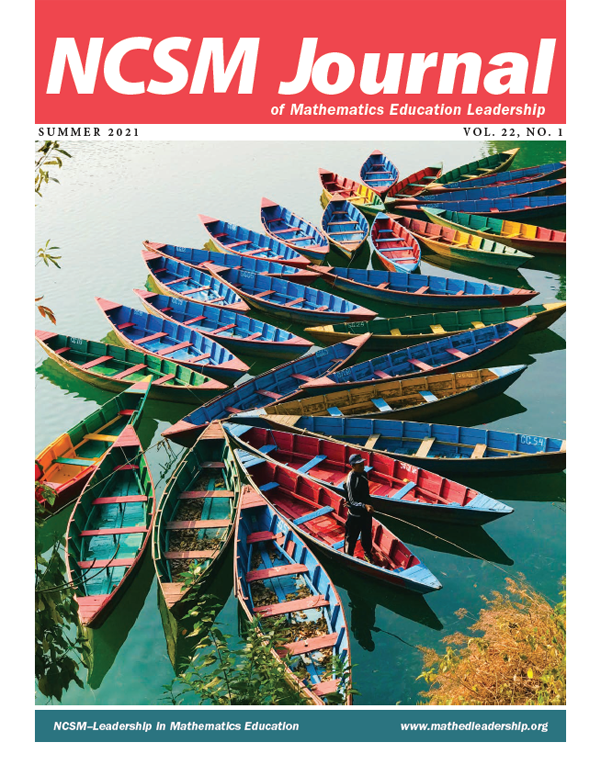
Summer 2021, Volume 22, Number 1
Table of ContentsView the Journal
Articles in this issue
CURRICULAR REFORM IN SCHOOLS: SECONDARY LEADERS’ PERCEPTIONS
by: Amanda Bauer, Erin Lehmann, Kristine Reed, Gwendolyn Zimmermann, Adlai E.
The landscape of PK–12 education is dynamic, constantly adapting to meet the needs and demands for student learning. These changes inspire curricular reforms, and such processes compound the complexity of leadership roles within PK–12 education settings. This study explored the nature and extent of transformational leadership practices and efficacy beliefs exhibited by secondary school leaders as they implement a mathematics curricular reform. In addition, the study examined the barriers of curricular reform processes as perceived by school leaders. This study employed a phenomenological methodology as participants were asked to describe their lived experiences within the context of the mathematics curricular reform. Semi-structured interviews and focus groups were used for data collection, allowing participants to share stories and examples that captured the essence of their lived experiences. The research findings suggest efficacy beliefs related to relationships and experience influence leaders’ transformational leadership practices as they facilitate curricular reforms in their schools. Furthermore, these transformational leadership practices may be used to address and overcome barriers throughout the implementation of curricular reforms.
View this article
DESIGN AND IMPACT OF FLEXIBLE, ASYNCHRONOUS ONLINE VIDEO-BASED MATHEMATICS PROFESSIONAL DEVELOPMENT
by: Nanette Seago, Angela Knotts, Catherine Carroll
In this article, we share the experimental research design and preliminary impact results from the Video in the Middle project, which is adapting existing face-to-face video-based mathematics professional development materials to online two-hour modules that can be used in flexible asynchronous formats: independent, locally facilitated, or developer facilitated. Preliminary research results indicate that teachers appreciated the variety of formats, found the modules useful and engaging, and learned to appreciate and use visual methods for solving problems, including using color to distinguish and highlight the relationship between numeric, algebraic, and geometric models. The benefits of this asynchronous PD became pronounced as the pandemic emerged during the research study and teachers found themselves shifting to remote instruction with little time to prepare.
View this article
AN INTERDISCIPLINARY COACHING APPROACH TO DATA-BASED INDIVIDUALIZATION: A YEAR-LONG PARTNERSHIP BETWEEN MATHEMATICS TEACHERS AND SPECIAL EDUCATION RESEARCHERS
by: William S. Walker III
This article describes a year-long partnership between a group of general education mathematics teachers and their special education researcher-coach counterparts, an experience we call interdisciplinary coaching. The purpose of this work was aimed at supporting teachers in adopting and implementing an evidence-based instructional practice intended to address the needs of students experiencing mathematics difficulty, including students with disabilities. Findings from this investigation indicate teachers had high rates of satisfaction with the coaching model and that, by some specific measures, this model demonstrates promise for improving teachers’ assessment practice within a data-based individualization framework. We describe the unique tensions and affordances that arose from this type of partnership and share recommendations for how others might engage in interdisciplinary coaching work.
View this article

Fall/Winter 2020, Volume 21, Number 2
Table of ContentsView the Journal
Articles in this issue
EXAMINING POTENTIAL PITFALLS THAT HINDER PRODUCTIVE COACHING CONVERSATIONS
by: Paula Jakopovic
Instructional coaching is a popular approach for providing professional development to classroom teachers that can help to enhance their knowledge and use of effective teaching practices. A growing body of research on mathematics instructional coaching, and mathematics coaching in particular, suggests that coaches can both increase teacher self efficacy and use of research based instructional practices and potentially have a positive impact on student achievement (Campbell & Malkus, 2011; Ellington et al., 2017; Knapp, 2017). To help ensure the effective implementation of coaching initiatives, researchers continue to examine the types of coaching practices that are most effective at creating these shifts. This paper adds to the literature on some of the challenges that coaches face in their planning conversations with classroom teachers and provides insights into how coaches and other mathematics education leaders can engage in productive coaching conversations that can foster reform-oriented shifts in teacher practice.
View this article
MAKING THE “CUT”: ONE DISTRICT’S STRATEGY OR ALGEBRA PLACEMENT
by: Neal Grandgenett, Roberta Jackson
Some of the most discussed issues in mathematics education today involve Algebra and its instruction. These issues include the optimal timeline for when students first take a formal algebra course, the related selection process for getting into that first course and what algebra instruction should generally look like throughout the curriculum. Algebra is being recognized as a key “gate-keeper” course for high school and college success and has even been called an emerging “civil rights issue” by some researchers and authors. When to place students into an algebra class and how to ensure that a student is ready for Algebra are both critical curriculum decisions for a district. In many districts, algebra placement is a process that may be undergoing considerable revision along with how algebra is integrated across the curriculum. This article describes one district’s approach for evaluating and revising their placement strategy for admitting students into their first middle school algebra course.
View this article
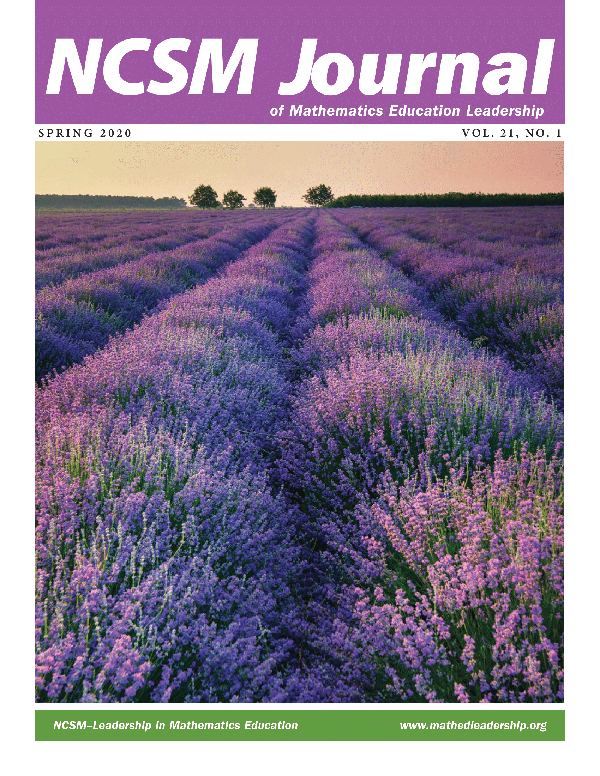
Spring 2020, Volume 21, Number 1
Table of ContentsView the Journal
Articles in this issue
USING ROLE PLAY TO REHEARSE PROBLEMS OF PRACTICE
by: Shannon Larsen, Cheryl Tobey
In this article, we share a professional development tool for use with mathematics coaches. We describe a protocol we created, inspired by research around Rehearsals in pre-service mathematics instruction, that supports coaches to practice addressing challenges they are likely to confront in their work. After introducing the research that has guided our thinking, we describe our Role Play Protocol and share data collected from coaches and administrators with whom we worked about the usefulness of this form of professional learning. We then outline modifications we have made and continue to make to the Role Play Protocol and discuss implications and future work needed to better understand how effective this tool is at supporting coaches’ learning and practice in the field.
View this article
PURPOSEFULLY COACHING MIDDLE SCHOOL TEACHERS: THE CASE OF AN EXEMPLARY MATHEMATICS SPECIALIST
by: Joy W. Whitenack, Aimee J. Ellington
In this paper, we share results from a large-scale, mixed design study that describe the work of mathematics specialists in middle schools and their impact on teacher learning and student achievement. Within the context of the larger study, we highlight the practices of one exemplary mathematics specialist and how her collaborations with teachers in her building contributed to the practices that they engaged in to achieve the common goals of growing as professionals and supporting their students’ learning. We use a coaching moves-heuristics model that is based on West and Staub’s (2003) framework for lesson design and analysis to characterize the types of moves that this specialist made that contributed to and supported the productive and effective community of practice in this school building.
View this article

Fall/Winter 2019, Volume 20, Number 2
Table of ContentsView the Journal
Articles in this issue
EQUITY-FOCUSED PROFESSIONAL DEVELOPMENT FOR ALGEBRA I TEACHERS IN URBAN DISTRICTS
by: Emily P. Bonner
Student data show that there is a need to develop a more culturally responsive mathematics teaching force. As such, we developed a framework for equity-focused professional development (EFPD) for mathematics teachers through which we hope to improve student access to mathematical knowledge. In this paper we present our EFPD framework, program, and initial results related to culturally responsive mathematics teaching. Further, we describe our process for tracking teacher progress. In this context, we present struggles that we have faced in implementing this framework in an effort to contribute to ongoing discussions about the ways in which the educational system in general and the current political climate in education impact EFPD.
View this article
TRANSITIONING FACE-TO-FACE MATHEMATICS PROFESSIONAL DEVELOPMENT TO SYNCHRONOUS ONLINE IMPLEMENTATION: DESIGN CONSIDERATIONS AND CHALLENGES
by: Julie M. Amador, Cynthia H. Callard, Jeffrey Choppin, Ryan Gillespie, Cynthia Carson
To make professional learning experiences more accessible to teachers, professional development providers redesigned a face-to-face professional learning experience – a Teaching Lab – for an online platform utilizing synchronous modalities. To design the online version of the Teaching Lab, our team employed design principles derived from research on high-quality professional development and from theories of technology use in education. We describe these design principles, the multiple iterations of the Teaching Lab, and the challenges we faced in the design process. We consider the roles of technology as replacement, amplification, transformation, or hindrance with respect to the online model. We conclude with a discussion of the technology framework to offer suggestions and considerations for mathematics education leaders who design professional learning opportunities.
View this article
TEACHER INTERPRETATIONS OF THE GOALS OF MATHEMATICS PROFESSIONAL DEVELOPMENT AND THE INFLUENCE ON CLASSROOM ENACTMENT
by: William S. Walker
This multiple-case study is an investigation of how four high school teachers interpreted the goals of a professional development (PD) program and how these interpretations influenced their instructional practices during observed lessons. The teachers participated in PD that focused on using standards-based pedagogy and mathematical tasks with higher-level demands. Each teacher stated an interpretation of the goals that was consistent with the PD, but concentrated on one of the objectives for each of the goals. The teachers’ interpretations of the goals influenced the lessons they taught and their use of ideas from the PD.
View this article
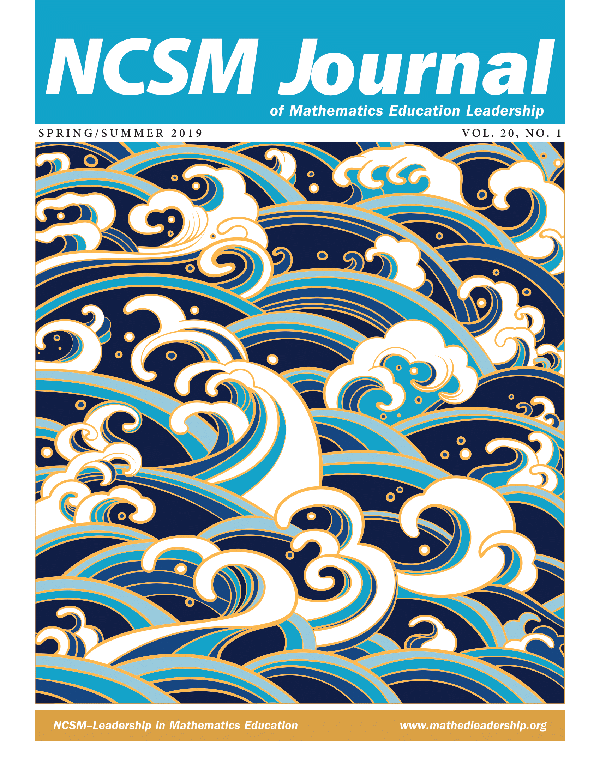
Spring 2019, Volume 20, Number 1
Table of ContentsView the Journal
Articles in this issue
POSITIVE & PRODUCTIVE COACHING: AN INTERVIEW PROTOCOL AND SYSTEMATIC APPROACH FOR CREATING COACHING GOALS
by: Theresa E. Wills, Molly Rawding
Mathematics coaches have an immense responsibility to uniquely coach a diverse group of teachers in “areas related to standards, curriculum, assessment, and professional development” (AMTE, 2010, p. 1). Because of the diversity of teacher’s needs and school settings, it is important that a coach establish personalized goals with each teacher. Establishing these goals and making sure they are effective requires a positive and trusting relationship with the teacher based on shared values. This article outlines an interview protocol to guide initial interactions and a systematic approach for identifying a coaching goal. Included is a sample interview, an analysis of the interview questions, and strategies for creating a productive and positive interview. By using this interview protocol, the coach will be able to select purposeful questions, build a positive relationship with the teacher, and obtain the necessary information to help create an effective coaching goal.
View this article
DISCONTINUITY IN ENACTED SCOPE AND SEQUENCE OF MIDDLE GRADES MATHEMATICS CONTENT
by: Lisa Kasmer, Travis Olson, Dawn Teuscher, Shannon Dingman
The 2010 release of the Common Core State Standards for Mathematics (CCSSM) initiated a tremendous effort to align the mathematics curriculum across the United States. However, the work of enacting these standards, including determining the order to teach grade-level standards, was often left to local schools and district experts to determine. These decisions were influenced by several factors and often formalized in scope and sequence documents, which outlined the order in which grade-level standards would be taught and the amount of time devoted to specific mathematical content and skills. In this paper, we report the analysis of eight Grade 8 mathematics teachers’ scope and sequence documents and the underlying factors that influenced their development. Given the discrepancies apparent across these eight documents, we discuss the implications stemming from these curricular decisions and recommend district leadership consider the connections across mathematical content when making decisions regarding the sequencing of topics in any grade level.
View this article
WHAT EDUCATIONAL LEADERS NEED TO KNOW ABOUT EARLY-CAREER MATHEMATICS TEACHERS
by: James A. Martinez, Lisa R. Amick
In response to a national crisis to retain middle and high school teachers in Science, Technology, Engineering and Mathematics (STEM) classrooms, a study was conducted to define factors that affect job satisfaction among early-career mathematics teachers, including perceived support by school administrators. Survey data gathered from 141 early-career mathematics teachers across the United States revealed the degree that administrative and peer support affected teachers’ perceptions of their enthusiasm for teaching mathematics. Results from the study are being used to design targeted professional development involving early-career mathematics teachers with their principals with the overarching goal being to increase retention for these teachers in middle and high schools. Connections are made to promote professional development aimed at developing instructional leadership skills among school leaders.
View this article
Individuals are free to copy and redistribute the material in any medium and format under the following terms:
- Proper attribution is given to the Journal of Mathematics Education Leadership, NCSM, and the authors, including a copyright notice, disclaimer notice, and a link to the material. Any modifications made to the original materials must be declared.
- The materials may not be used for commercial purposes.
- Derivatives of the content which remix, transform, or build upon the materials may not be distributed.
